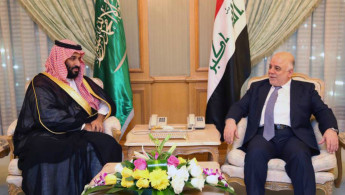Baghdad, Riyadh agree to swap suspected Saudi jihadists with alleged Iraqi Shia militants
Iraqi Prime Minister Haider al-Abadi and Saudi King Salman reportedly agreed to exchange dozens of alleged Saudi IS fighters imprisoned in Iraq for two Iraqis who are accused of being members of Shia pro-Iranian militias during talks in Riyadh on Monday.
"There has been an agreement to extradite Saudis arrested on terrorism charges who are being held in al-Hout Prison in southern Iraq," the source, who spoke on the condition of anonymity, said.
The source said that in exchange two imprisoned Iraqis, who were arrested last year in the Grand Mosque in Mecca after they shouted "sectarian slogans", would be sent to Baghdad.
The source added that Riyadh has also promised to provide Iraq with military aid in the form of "ammunition and medium weaponry" to help in the fight against IS.
According to Iraqi military sources, there are around 75 Saudis detained in the prison, most of whom have been arrested over the past year during the ongoing military offensive against IS.
Iraqi media reported on Tuesday that the Iraqi prisoners set to be released at the end of the holy month of Ramadan were Rashid al-Maqdisi and another unnamed Iraqi citizen, who both allegedly have close ties to the Iran-backed Hashed al-Shaabi paramilitary group.
Abadi's visit to Saudi Arabia was his first since he became prime minister in 2014.
In a joint statement, Iraq and Saudi Arabia expressed "their happiness over... a qualitative leap in relations" after Abadi met King Salman.
It made no mention of Gulf tensions with Qatar, but the two sides agreed to intensify efforts against extremism and "terrorism".
Abadi's visit, which had been postponed to avoid appearing to take sides in the diplomatic dispute, came after Saudi Arabia, the United Arab Emirates and other allies cut ties with Qatar more than two weeks ago.
Iraqi political analyst Hassan al-Eidani told The New Arab that the reports of the prisoner exchange signals that Baghdad is attempting to benefit from the Gulf diplomatic crisis and could possibly side with the Saudi-led alliance.
One of the elements of the dispute has been money allegedly paid in April by Qatar to Hashed al-Shaabi groups in order to free members of its ruling family kidnapped in Iraq in 2015. Qatar denies paying any ransom to the kidnappers.





 Follow the Middle East's top stories in English at The New Arab on Google News
Follow the Middle East's top stories in English at The New Arab on Google News
![Israeli forces ordered bombed Gaza's Jabalia, ordering residents to leave [Getty]](/sites/default/files/styles/image_330x185/public/2176418030.jpeg?h=a5f2f23a&itok=_YGZaP1z)

